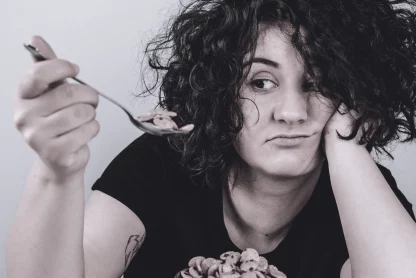Do you know that your diet is to be partly blamed for making you feel blue?!
A healthy diet helps not only control your waistline but also erase off the various symptoms of depression. A varied diet with plenty of fruits, vegetables, whole grains, nuts, beans and food rich in omega-3 fatty acids is the best nutritional plan to prevent depression. Along with the intake of a healthy diet, one should also cut down on processed and pre-packaged foods[1].
Your mood, your ability to tame stress, ease anxiety and fight depression get positively impacted by the intake of the right nutrients over time.
If you are wondering about the right diet, here are the types of nutrients that can set your mood straight and going.
People who consume fish the most are less likely to have depression symptoms.
Journal of Medicine and Life (2012)
Omega-3 Fatty Acids
Omega-3 fatty acids which are abundantly found in oily fish such as sardines, salmon, and mackerel, have a key role in brain functioning. Deficiencies in omega-3 fatty acids can be linked to many mental health problems including depression.
A study published in the Journal of Medicine and Life reveals that the people who consume fish the most are less likely to have depression symptoms[2].
Sources: Wild Alaskan salmon, Sardines, Anchovies, Mackerel, Other oily fish, Walnuts, Canola oil, Purslane (an herb)
Probiotics
Probiotics are best known for their active role in digestive health. But recent findings suggest that the bacteria in the gut can receive and send signals to the brain. This is referred to as the gut-brain axis.
Consuming probiotic supplements is shown to improve the symptoms of both depression and irritable bowel syndrome[3].
Sources: Yogurt, Kefir, Buttermilk, Sauerkraut, Korean kimchi, Miso, Tempeh, Pickled vegetables
Whole Grains
Protein-rich food can boost yourself and clear your mind.
One of the most important sources of vitamin B and other nutrients vital for brain health is whole grains. Thiamine (vitamin B1) plays a key role in turning glucose into energy. Vitamin B5 is needed to produce the neurotransmitter acetylcholine which is involved in learning and memory. Vitamin B6 helps in converting the amino acid tryptophan into serotonin and vitamin B12 in the production of other neurotransmitters[4].
In short, whole grains are necessary to keep our physical and mental activities sharp and active.
Sources: Steel-cut oatmeal, Quinoa, Brown rice, Amaranth, Millet, Bulgur, Wild rice
Protein-Rich Foods
Protein-rich foods like turkey, tuna, and chicken have an amino acid called tryptophan. This helps synthesize serotonin -a neurotransmitter that promotes a balanced mood and healthy sleep.
In 3 ounces of roasted chicken breast, about 123% of the recommended daily intake of tryptophan is produced. By eating protein-rich food, you will be able to boost yourself and clear your mind.
Sources: Beans and peas, lean beef, low-fat cheese, fish, milk, poultry, soy products, and yogurt.
Zinc supplements help antidepressants work more effectively .
Indian journal of psychiatry(2008)
Zinc
Zinc is important for the body to perceive taste. However, it even more necessary to boost our immune system and influence depression.
A recent study shows that zinc levels are lower in people with depression. Zinc supplements help antidepressants work more effectively[5].
Sources: Whole grains, oysters, beef, chicken, and pork, beans, nuts, pumpkin seeds
Antioxidants
Antioxidants are derived from foods containing vitamins A, C, and E. They play an important role in removing free radicals from our body.
Free radicals are the waste products that get build up in the body as a result of natural bodily processes. If they are not eliminated from time to time, they will develop oxidative stress.
According to a 2012 study, consuming vitamins that provide antioxidants can reduce symptoms of anxiety and depression[6].
Sources: Blueberries, dark chocolate, artichokes, pecans, Red cabbage, strawberries, raspberries, red or purple grapes.










thanks for the article
That one TEDx Video about antioxidants is the reason why we Blueberries are so expensive right now.